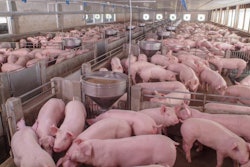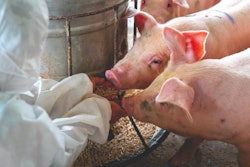
In the face of ‘the biggest animal disease outbreak of our generation,’ the FAO and the OIE are calling on all countries to join together to bring deadly African swine fever under control.
While African swine fever (ASF) only infects members of the pig family, and poses no direct threat to human health, its indirect impacts may cause serious economic hardship. This is demonstrated through disruption to food security, as well as hitting the lives and incomes of individual pig farmers.
Concerned that these threats have been growing particularly over the past two years, the
Food and Agriculture Organization of the United Nations (FAO) and World Organisation for Animal Health (OIE) are calling on all countries and agencies to cooperate in order to bring ASF under control before its deleterious effects spread further and bite even deeper.
To introduce their initiative for the Global Control of ASF, the two agencies have been hosting a weeklong event. The aim is to highlight the threats posed by ASF to national and local economies, and to stimulate cooperation between and among stakeholders in governments, specialists and industry.
ASF: global perspective
While the first aim of the initiative is to halt the spread of ASF, FAO director-general Qu Dongyu said that the ultimate goal is to eradicate the disease altogether.
As the infection continues to spread, OIE director-general Monique Eloit stressed that ASF threatens every country.
“It is the biggest animal disease outbreak of our generation,” she said.
Effective control of ASF requires further investment in veterinary services, as well as the implementation of international standards for biosecurity and surveillance, according to Eloit.
During the weeklong virtual event, representatives from government, the veterinary profession, and others with specialist knowledge will exchange their experiences of disease control as well as the latest research. With this approach, organizers aim to stimulate more coordinated action to bring ASF under control.
Under the umbrella of the Global Framework for the Progressive Control of Transboundary Diseases, GF-TADs, the joint program adds ASF to foot-and-mouth disease.
Since 2016, a total of 14,327 ASF outbreaks have been reported in domestic pigs worldwide across three continents — Asia, Europe and Africa. Of this total, 9,928 were in Asia, 4,271 in Europe, and almost 213,800 in Africa, according to the latest review by the OIE. Over 8.2 million animals have been lost the disease. Also directly affected by ASF over the same period have been 32,265 wild pigs in European and Asian countries.
China: ASF detected in pigs in transit
In the Liangshan Yi Autonomous Region of Sichuan province, the authorities have reported new cases of ASF.
According to China’s agriculture ministry, 14 animals in a vehicle showed signs of the disease when stopped in a vehicle at a highway checkpoint in Ningnan county last week. Transportation of these animals was unauthorized. Of the total of 35 pigs, seven died and the rest have been destroyed. The vehicle and surrounding area have been cleaned and disinfected.
This brings to five the number of confirmed ASF outbreaks in Sichuan province since early March. One of these was detected in a village herd, while the others were discovered as a result of transport checks. Cases have been found in four different regions of the province.
Further cases in Russia’s Far East
Over the past week, Russia’s agriculture ministry has reported to the OIE three new outbreaks of ASF in its Far Eastern federal district.
The virus was detected in one wild boar, as well as in two backyard pig herds. Located in the neighboring regions of Primorsky krai and Khabarovsk krai, the herds had a total of four animals, two of which died. The fate of the others is not reported.
Since the first outbreak in this region of Russia in August 2019, there have been almost 180 confirmed ASF outbreaks in domestic pigs.
South Korea remains on ASF alert
Authorities continue their efforts to control the spread of ASF in South Korea, according to Yonhap news agency. More than 1,200 farms are contacted daily to alert for the earliest possible indications of additional cases.
This month, the disease re-emerged in domestic pigs in two outbreaks, but no new cases have been confirmed since that time.
During September and October 2019, ASF outbreaks occurred at 14 farms in South Korea. Subsequent controls led to the culling of around 400,000 pigs across the country. More than 750 wild boar — particularly in the provinces bordering North Korea — have tested positive for the ASF virus over the past year or so.
Vietnam’s pig market stabilizes
As a result of the ASF outbreaks that hit Vietnam in 2019, more than 5.97 million pigs died, according to the OIE.
A senior official in the agriculture ministry has recently stated that, as of July 2020, the country’s pig population stood at 25.2 million. Vietnam News reports that this is around 18% below the total before ASF hit the country in early 2019.
As a result of imports of live pigs and meat, as well as a decline in demand, pork prices have been falling across the country. At a wholesale market in Ho Chi Minh City, the price recently stood at VND72,000 (US$3.11) per kilo. In previous months, it had reached VND80,000 per kilo.
In Vietnam, several companies are authorized to import live pigs from Thailand. So far, the number stands at 4.7 million animals. Meanwhile, Canada, Germany, Poland, the U.S., Spain and Russia have supplied the Vietnamese market with pork meat. At more than 93,000 metric tons for the first 7 months of 2020, this represents a year-on-year increase of 223%.
View our continuing coverage of the global African swine fever situation.


















